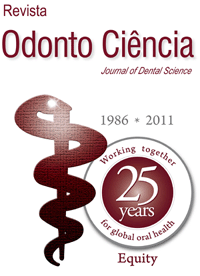INTERVIEW
The Forsyth Institute. Cambridge MA, USA. E-mail: tvandyke@forsyth.org
Thomas Van Dyke, DDS, Ph.D., is Vice President for Clinical and Translational Research and Chair of the Department of Periodontology of the Forsyth Institute. Forsyth, an independent non-profit organization, is affiliated with Harvard School of Dental Medicine and Harvard Medical School and has collaborations with university and research organizations around the world.
Dr. Van Dyke has authored/co-authored more than 250 original articles, and numerous abstracts and book chapters. His research interests are the structural and functional relationship of abnormalities of the inflammatory process with focus on regulation of phagocytic cells, in the etiology and pathogenesis of periodontal diseases. He is best known for his work on the pathways of resolution of inflammation and pathogenesis of periodontal diseases, neutrophil biology, and clinical research.
■ Rev Odonto Cienc - Translational research has been a hot topic in biomedical sciences. In Dentistry, the development of basic knowledge and technologies for human use is often not easy as the industry has limited financial range compared to other biomedical specialties. What should we do to improve the perspectives of translational research in the dental field?
□ Dr. Van Dyke: For many years, new technologies in Dentistry have been materials based for the most part. In that realm, translational research leading to new products actually has been quite robust. One needs only to pick up a dental trade magazine to see the plethora of new products that are continuously brought to market. This is true also in the device arena; new dental devices come to market on a regular basis. The area that has been slow to reach the dental market is pharmacologic therapeutics. We certainly use pharmacotherapeutics in dentistry on a daily basis, but those drugs (like antibiotics) were not developed for dental reasons or for specific dental targets. The pipeline for new drugs in dentistry is small, which is in large part due to the cost of the development process vs. the perceived size of the dental market. The cost benefit ratio is not thought to be favorable. This may in large part be perception rather than reality. Oral disease is a potentially huge market. However, a blockbuster drug that is going to change treatment will be needed to make the cost benefit ratio favorable. Incremental improvements in materials have lower development costs and can be brought to market with reasonable profits; this has not been found to be true in the drug market, so far.
■ Rev Odonto Cienc - You have participated actively in the discovery of new components that actively enhance resolution of inflammation. The application of these molecules (lipid mediators) for the prevention and treatment of periodontal diseases has been tested. Do you believe these findings reduce the importance of bacterial infection in periodontal disease?
□ Dr. Van Dyke - No, it does not reduce the importance of bacteria; bacteria will always be the etiology of periodontitis. However, the pathogenesis of periodontitis is inflammatory. It would appear that the susceptibility to periodontitis, that is the inflammatory response to the bacteria that destroys the tissues, is determined by the host; the individual who gets the disease. I think of this is two phases: the etiology is bacteria, the pathogenesis is inflammatory. Hence, we have two potential targets in the prevention and treatment of periodontitis. We can eliminate the etiology and/or we can control the inflammation. Ever since Harold Loe and co-workers described the bacterial etiology of periodontitis, we have been trying to control the bacteria, with limited results. Therapies that target inflammation provide a new avenue to control disease that has not been well explored. Enhancing resolution is thought to be a better approach than inhibiting inflammation because there are no side effects associated with promoting a biological process.
■ Rev Odonto Cienc - You have recently moved to the Forsyth Institute. In what sense this shift may impact your research?
□ Dr. Van Dyke - The Forsyth Institute is world renowned for research and discovery in oral health. As an independent research institute, rather than a school, the faculty there has more freedom to devote their efforts to the pursuit of research questions and development of new therapeutics. I hope I can use this extra time and the resources of the Forsyth wisely.
The Science Transfer Series: Translational research
Publication Dates
-
Publication in this collection
02 Sept 2011 -
Date of issue
2011


